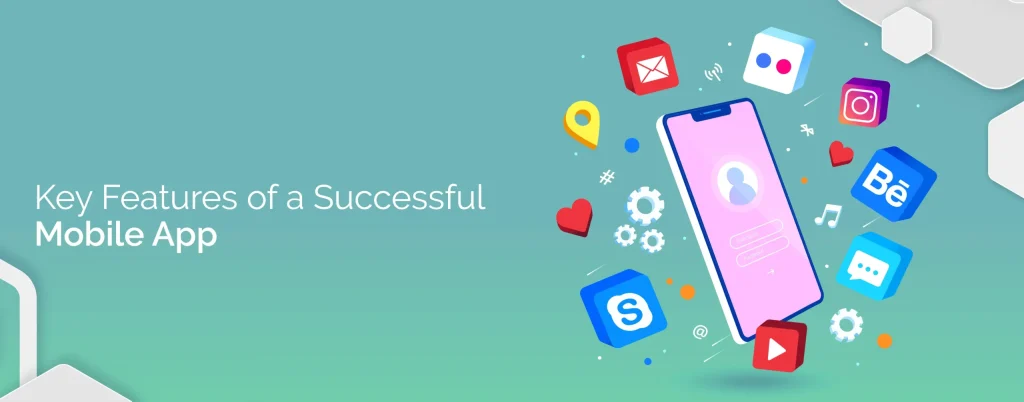
Introduction:
The mobile app industry is constantly evolving, and competition is fiercer than ever. To stand out in this crowded market, a mobile app needs to offer more than just core functionalities. Today’s users expect seamless experiences, intuitive designs, and essential features that cater to their needs. In this blog, we’ll explore the critical features every mobile app should include to stay competitive and ensure user satisfaction.
1. User-Friendly Interface (UI/UX Design):
A mobile app’s design is one of the first things a user interacts with, and it can make or break the user experience. An intuitive and attractive user interface ensures that users can navigate the app easily without confusion. Important considerations include:
Clear Navigation: Menus and buttons should be simple and easy to find.
Consistent Design: Keep the color scheme and fonts uniform to provide a cohesive experience.
Responsive Layouts: Ensure the app works smoothly across various screen sizes and orientations.
Accessible Features: Include support for users with disabilities, such as screen readers and voice controls.
2. Fast Loading Speed:
In today’s fast-paced world, users have little patience for slow apps. A mobile app should load quickly and perform smoothly under various network conditions. Delays in loading or sluggish performance can lead to user frustration and app abandonment.
Optimize Images and Media: Compress images and videos to reduce load times.
Efficient Code: Ensure that the app’s code is optimized for faster processing.
Preload Content: Anticipate user actions and load the required data in advance to improve responsiveness.
3. Security and Data Privacy:
With an increasing number of cyber threats, ensuring user data security is paramount. App developers must implement stringent security measures to protect user information from breaches.
End-to-End Encryption: Secure user communications and data transmission.
Two-Factor Authentication (2FA): Provide an additional layer of security during login.
Regular Security Updates: Patch vulnerabilities with frequent updates to prevent potential attacks.
Compliance with Privacy Laws: Ensure the app complies with regulations like GDPR to handle user data responsibly.
4. Offline Functionality:
While internet connectivity is becoming more widespread, it’s still essential to design an app that functions, at least partially, without internet access. Offline functionality increases usability in areas with poor or no connectivity.
Local Data Storage: Store critical data on the device for offline access.
Sync When Online: Allow data to sync with the server automatically when the user reconnects to the internet.
5. Push Notifications:
Push notifications are essential for keeping users engaged with the app. They provide timely updates, reminders, and personalized messages to re-engage users. However, overusing them can annoy users, so a balance must be struck.
Customizable Notifications: Let users choose the type and frequency of notifications they receive.
Relevant and Personalized: Tailor notifications to individual user preferences to keep them engaged.
Timing is Key: Send notifications at optimal times based on user behavior and time zones.
6. In-App Search:
As your app grows in content and features, users will need a quick and efficient way to find what they are looking for. Implementing a robust in-app search feature enhances the user experience by reducing the time spent navigating through menus.
Search Filters: Allow users to filter search results based on criteria such as date, category, or relevance.
Auto-Suggestions: Display suggestions as users type, improving the search speed.
Recent Searches: Show users their recent searches to allow quick access.
7. Integration with Social Media Platforms:
Most mobile users today are active on social media platforms, and integrating social media features can enhance user engagement. Features such as social logins, content sharing, and inviting friends via social media platforms increase the app’s visibility and usability.
Social Login: Allow users to log in via platforms like Facebook, Google, or Apple ID for quicker access.
Shareable Content: Enable users to share app content directly on their social media profiles.
Friend Invitations: Allow users to invite their friends to join the app via social media.
8. Multilingual Support:
If you’re aiming to reach a global audience, your app must support multiple languages. Offering multilingual support increases accessibility and enhances the user experience across various regions.
Dynamic Language Switching: Allow users to switch languages without restarting the app.
Localized Content: Ensure that translations consider cultural nuances, not just direct word-for-word translations.
9. Analytics and User Insights:
Understanding how users interact with your app is crucial for ongoing improvements. Analytics tools help track user behavior, identify popular features, and detect areas where users face issues. This data is invaluable for enhancing the user experience.
Real-time Analytics: Track user interactions and app performance in real time.
User Segmentation: Analyze user groups based on demographics, behavior, and engagement levels.
Error Reporting: Monitor and address bugs or crashes promptly.
10. Regular Updates and Support:
In the fast-paced world of mobile apps, regular updates and support are essential for success. These updates not only fix bugs and enhance performance but also introduce new features that keep users engaged. Providing consistent support helps address user concerns promptly, fostering a positive experience. Additionally, regular maintenance ensures the app remains secure and compliant with the latest standards. Ultimately, a commitment to updates and support builds user trust and loyalty, setting the foundation for long-term growth.
Frequent Updates: Roll out updates regularly to fix bugs and introduce new features.
User Feedback Channels: Allow users to submit feedback or report issues directly within the app.
24/7 Support: Provide round-the-clock support for users to resolve any issues they face.
Conclusion:
In today’s competitive mobile app market, offering essential features that cater to user needs and expectations is key to success. From an intuitive user interface to advanced security measures, push notifications, and offline functionality, these features ensure that your app delivers a seamless, engaging, and secure experience. By continuously updating and improving your app based on user feedback and analytics, you can stay ahead in the fast-evolving mobile app industry.
Also Read: How to Choose the Right Mobile App Development Framework
